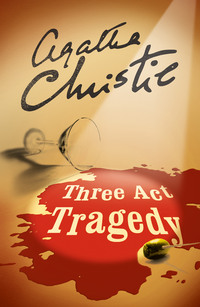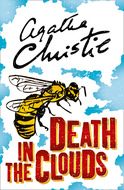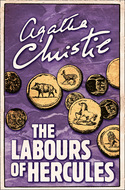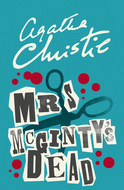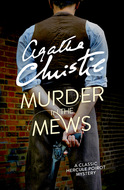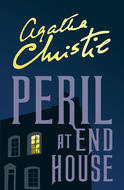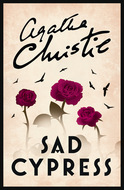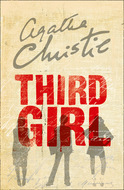Das Buch kann nicht als Datei heruntergeladen werden, kann aber in unserer App oder online auf der Website gelesen werden.
Buch lesen: "Three Act Tragedy"

Three Act Tragedy

 Copyright
Copyright
This novel is entirely a work of fiction. The names, characters and incidents portrayed in it are the work of the author’s imagination. Any resemblance to actual persons, living or dead, events or localities is entirely coincidental.
HarperCollinsPublishers Ltd.
1 London Bridge Street
London SE1 9GF
First published in Great Britain by Collins 1935
Agatha Christie® Poirot® Three Act Tragedy™
Copyright © 1935 Agatha Christie Limited (a Chorion company). All rights reserved.
Cover design © HarperCollinsPublishers Ltd 2016
Title lettering by Ghost Design
Cover photograph © Ray Spence/Arcangel Images
Agatha Christie asserts the moral right to be identified as the author of this work
A catalogue copy of this book is available from the British Library
All rights reserved under International and Pan-American Copyright Conventions. By payment of the required fees, you have been granted the non-exclusive, non-transferable right to access and read the text of this ebook on screen. No part of this text may be reproduced, transmitted, down-loaded, decompiled, reverse engineered, or stored in or introduced into any information storage and retrieval system, in any form or by any means, whether electronic or mechanical, now known or hereinafter invented, without the express written permission of HarperCollins ebooks
HarperCollinsPublishers has made every reasonable effort to ensure that any picture content and written content in this ebook has been included or removed in accordance with the contractual and technological constraints in operation at the time of publication
Source ISBN: 9780007120901
Ebook Edition © SEPTEMBER 2016 ISBN: 9780007422883
Version: 2019-01-08
Dedication
Dedicated to
My Friends, Geoffrey and Violet Shipston
Contents
Cover
Title Page
Copyright
Dedication
First Act: Suspicion
1. Crow’s Nest
2. Incident Before Dinner
3. Sir Charles Wonders
4. A Modern Elaine
5. Flight From a Lady
Second Act: Certainty
1. Sir Charles Receives a Letter
2. The Missing Butler
3. Which of Them?
4. The Evidence of the Servants
5. In the Butler’s Room
6. Concerning an Ink-Stain
7. Plan of Campaign
Third Act: Discovery
1. Mrs Babbington
2. Lady Mary
3. Re-enter Hercule Poirot
4. A Watching Brief
5. Division of Labour
6. Cynthia Dacres
7. Captain Dacres
8. Angela Sutcliffe
9. Muriel Wills
10. Oliver Manders
11. Poirot Gives a Sherry Party
12. Day at Gilling
13. Mrs de Rushbridger
14. Miss Milray
15. Curtain
Keep Reading
Also by Agatha Christie
About the Publisher
Directed by
Sir Charles Cartwright
Assistant Directors
Mr Satterthwaite
Miss Hermione Lytton Gore
Clothes by
Ambrosine Ltd
Illumination by
Hercule Poirot
FIRST ACT
CHAPTER 1
Crow’s Nest
Mr Satterthwaite sat on the terrace of ‘Crow’s Nest’ and watched his host, Sir Charles Cartwright, climbing up the path from the sea.
Crow’s Nest was a modern bungalow of the better type. It had no half timbering, no gables, no excrescences dear to a third-class builder’s heart. It was a plain white solid building—deceptive as to size, since it was a good deal bigger than it looked. It owed its name to its position, high up, overlooking the harbour of Loomouth. Indeed from one corner of the terrace, protected by a strong balustrade, there was a sheer drop to the sea below. By road Crow’s Nest was a mile from the town. The road ran inland and then zigzagged high up above the sea. On foot it was accessible in seven minutes by the steep fisherman’s path that Sir Charles Cartwright was ascending at this minute.
Sir Charles was a well-built, sunburnt man of middle age. He wore old grey flannel trousers and a white sweater. He had a slight rolling gait, and carried his hands half closed as he walked. Nine people out of ten would say, ‘Retired Naval man—can’t mistake the type.’ The tenth, and more discerning, would have hesitated, puzzled by something indefinable that did not ring true. And then perhaps a picture would rise, unsought: the deck of a ship—but not a real ship—a ship curtailed by hanging curtains of thick rich material—a man, Charles Cartwright, standing on that deck, light that was not sunlight streaming down on him, the hands half clenched, the easy gait and a voice—the easy pleasant voice of an English sailor and gentleman, a great deal magnified in tone.
‘No, sir,’ Charles Cartwright was saying, ‘I’m afraid I can’t give you any answer to that question.’
And swish fell the heavy curtains, up sprang the lights, an orchestra plunged into the latest syncopated measure, girls with exaggerated bows in their hair said, ‘Chocolates? Lemonade?’ The first act of The Call of the Sea, with Charles Cartwright as Commander Vanstone, was over.
From his post of vantage, looking down, Mr Satterthwaite smiled.
A dried-up little pipkin of a man, Mr Satterthwaite, a patron of art and the drama, a determined but pleasant snob, always included in the more important house-parties and social functions (the words ‘and Mr Satterthwaite’ appeared invariably at the tail of a list of guests). Withal a man of considerable intelligence and a very shrewd observer of people and things.
He murmured now, shaking his head, ‘I wouldn’t have thought it. No, really, I wouldn’t have thought it.’
A step sounded on the terrace and he turned his head. The big grey-haired man who drew a chair forward and sat down had his profession clearly stamped on his keen, kindly, middle-aged face. ‘Doctor’ and ‘Harley Street’. Sir Bartholomew Strange had succeeded in his profession. He was a well-known specialist in nervous disorders, and had recently received a knighthood in the Birthday Honours list.
He drew his chair forward beside that of Mr Satterthwaite and said:
‘What wouldn’t you have thought? Eh? Let’s have it.’
With a smile Mr Satterthwaite drew attention to the figure below rapidly ascending the path.
‘I shouldn’t have thought Sir Charles would have remained contented so long in—er—exile.’
‘By Jove, no more should I!’ The other laughed, throwing back his head. ‘I’ve known Charles since he was a boy. We were at Oxford together. He’s always been the same—a better actor in private life than on the stage! Charles is always acting. He can’t help it—it’s second nature to him. Charles doesn’t go out of a room—he “makes an exit”—and he usually has to have a good line to make it on. All the same, he likes a change of part—none better. Two years ago he retired from the stage—said he wanted to live a simple country life, out of the world, and indulge his old fancy for the sea. He comes down here and builds this place. His idea of a simple country cottage. Three bathrooms and all the latest gadgets! I was like you, Satterthwaite, I didn’t think it would last. After all, Charles is human—he needs his audience. Two or three retired captains, a bunch of old women and a parson—that’s not much of a house to play to. I thought the “simple fellow, with his love of the sea,” would run for six months. Then, frankly, I thought he’d tire of the part. I thought the next thing to fill the bill would be the weary man of the world at Monte Carlo, or possibly a laird in the Highlands—he’s versatile, Charles is.’
The doctor stopped. It had been a long speech. His eyes were full of affection and amusement as he watched the unconscious man below. In a couple of minutes he would be with them.
‘However,’ Sir Bartholomew went on, ‘it seems we were wrong. The attraction of the simple life holds.’
‘A man who dramatises himself is sometimes misjudged,’ pointed out Mr Satterthwaite. ‘One does not take his sincerities seriously.’
The doctor nodded.
‘Yes,’ he said thoughtfully. ‘That’s true.’
With a cheerful halloo Charles Cartwright ran up the steps on to the terrace.
‘Mirabelle surpassed herself,’ he said. ‘You ought to have come, Satterthwaite.’
Mr Satterthwaite shook his head. He had suffered too often crossing the Channel to have any illusions about the strength of his stomach afloat. He had observed the Mirabelle from his bedroom window that morning. There had been a stiff sailing breeze and Mr Satterthwaite had thanked heaven devoutly for dry land.
Sir Charles went to the drawing-room window and called for drinks.
‘You ought to have come, Tollie,’ he said to his friend. ‘Don’t you spend half your life sitting in Harley Street telling your patients how good life on the ocean wave would be for them?’
‘The great merit of being a doctor,’ said Sir Bartholomew, ‘is that you are not obliged to follow your own advice.’
Sir Charles laughed. He was still unconsciously playing his part—the bluff breezy Naval man. He was an extraordinarily good-looking man, beautifully-proportioned, with a lean humorous face, and the touch of grey at his temples gave him a kind of added distinction. He looked what he was—a gentleman first and an actor second.
‘Did you go alone?’ asked the doctor.
‘No,’ Sir Charles turned to take his drink from a smart parlourmaid who was holding a tray. ‘I had a “hand”. The girl Egg, to be exact.’
There was something, some faint trace of self-consciousness in his voice which made Mr Satterthwaite look up sharply.
‘Miss Lytton Gore? She knows something about sailing, doesn’t she?’
Sir Charles laughed rather ruefully.
‘She succeeds in making me feel a complete land-lubber; but I’m coming on—thanks to her.’
Thoughts slipped quickly in and out of Mr Satterthwaite’s mind.
‘I wonder—Egg Lytton Gore—perhaps that’s why he hasn’t tired—the age—a dangerous age—it’s always a young girl at that time of life …’
Sir Charles went on: ‘The sea—there’s nothing like it—sun and wind and sea—and a simple shanty to come home to.’
And he looked with pleasure at the white building behind him, equipped with three bathrooms, hot and cold water in all the bedrooms, the latest system of central heating, the newest electrical fittings and a staff of parlourmaid, housemaid, chef, and kitchen-maid. Sir Charles’s interpretation of simple living was, perhaps, a trifle exaggerated.
A tall and exceedingly ugly woman issued from the house and bore down upon them.
‘Good morning, Miss Milray.’
‘Good morning, Sir Charles. Good morning.’ (A slight inclination of the head towards the other two). ‘This is the menu for dinner. I don’t know whether you would like it altered in any way?’
Sir Charles took it and murmured:
‘Let’s see. Melon Cantaloupe, Bortsch Soup, Fresh Mackerel, Grouse, Soufflé Surprise, Canapé Diane … No, I think that will do excellently, Miss Milray. Everyone is coming by the four-thirty train.’
‘I have already given Holgate his orders. By the way, Sir Charles, if you will excuse me, it would be better if I dined with you tonight.’
Sir Charles looked startled, but said courteously:
‘Delighted, I am sure, Miss Milray—but—er—’
Miss Milray proceeded calmly to explain.
‘Otherwise, Sir Charles, it would make thirteen at table; and so many people are superstitious.’
From her tone it could be gathered that Miss Milray would have sat down thirteen to dinner every night of her life without the slightest qualm. She went on:
‘I think everything is arranged. I have told Holgate the car is to fetch Lady Mary and the Babbingtons. Is that right?’
‘Absolutely. Just what I was going to ask you to do.’
With a slightly superior smile on her rugged countenance, Miss Milray withdrew.
‘That,’ said Sir Charles reverently, ‘is a very remarkable woman. I’m always afraid she’ll come and brush my teeth for me.’
‘Efficiency personified,’ said Strange.
‘She’s been with me for six years,’ said Sir Charles. ‘First as my secretary in London, and here, I suppose, she’s a kind of glorified housekeeper. Runs this place like clockwork. And now, if you please, she’s going to leave.’
‘Why?’
‘She says’—Sir Charles rubbed his nose dubiously—‘she says she’s got an invalid mother. Personally I don’t believe it. That kind of woman never had a mother at all. Spontaneously generated from a dynamo. No, there’s something else.’
‘Quite probably,’ said Sir Bartholomew, ‘people have been talking.’
‘Talking?’ The actor stared. ‘Talking—what about?’
‘My dear Charles. You know what talking means.’
‘You mean talking about her—and me? With that face? And at her age?’
‘She’s probably under fifty.’
‘I suppose she is.’ Sir Charles considered the matter. ‘But seriously, Tollie, have you noticed her face? It’s got two eyes, a nose and a mouth, but it’s not what you would call a face—not a female face. The most scandal-loving old cat in the neighbourhood couldn’t seriously connect sexual passion with a face like that.’
‘You underrate the imagination of the British spinster.’
Sir Charles shook his head.
‘I don’t believe it. There’s a kind of hideous respectability about Miss Milray that even a British spinster must recognize. She is virtue and respectability personified—and a damned useful woman. I always choose my secretaries plain as sin.’
‘Wise man.’
Sir Charles remained deep in thought for some minutes. To distract him, Sir Bartholomew asked: ‘Who’s coming this afternoon?’
‘Angie, for one.’
‘Angela Sutcliffe? That’s good.’
Mr Satterthwaite leaned forward interestedly, keen to know the composition of the house-party. Angela Sutcliffe was a well-known actress, no longer young, but with a strong hold on the public and celebrated for her wit and charm. She was sometimes spoken of as Ellen Terry’s successor.
‘Then there are the Dacres.’
Again Mr Satterthwaite nodded to himself. Mrs Dacres was Ambrosine, Ltd, that successful dressmaking establishment. You saw it on programmes—‘Miss Blank’s dresses in the first act by Ambrosine Ltd, Brook Street.’ Her husband, Captain Dacres, was a dark horse in his own racing parlance. He spent a lot of time on race courses—had ridden himself in the Grand National in years gone by. There had been some trouble—nobody knew exactly—though rumours had been spread about. There had been no inquiry—nothing overt, but somehow at mention of Freddie Dacres people’s eyebrows went up a little.
‘Then there’s Anthony Astor, the playwright.’
‘Of course,’ said Mr Satterthwaite. ‘She wrote One-Way Traffic. I saw it twice. It made a great hit.’
He rather enjoyed showing that he knew that Anthony Astor was a woman.
‘That’s right,’ said Sir Charles. ‘I forget what her real name is—Wills, I think. I’ve only met her once. I asked her to please Angela. That’s the lot—of the house-party, I mean.’
‘And the locals?’ asked the doctor.
‘Oh, the locals! Well, there are the Babbingtons—he’s the parson, quite a good fellow, not too parsonical, and his wife’s a really nice woman. Lectures me on gardening. They’re coming—and Lady Mary and Egg. That’s all. Oh, yes, there’s a young fellow called Manders, he’s a journalist, or something. Good-looking young fellow. That completes the party.’
Mr Satterthwaite was a man of methodical nature. He counted heads.
‘Miss Sutcliffe, one, the Dacres, three, Anthony Astor, four, Lady Mary and her daughter, six, the parson and his wife, eight, the young fellow nine, ourselves twelve. Either you or Miss Milray must have counted wrong, Sir Charles.’
‘It couldn’t be Miss Milray,’ said Sir Charles with assurance. ‘That woman’s never wrong. Let me see: Yes, by Jove, you’re right. I have missed out one guest. He’d slipped my memory.’
He chuckled. ‘Wouldn’t be best pleased at that, either. The fellow is the most conceited little devil I ever met.’
Mr Satterthwaite’s eyes twinkled. He had always been of the opinion that the vainest men in creation were actors. He did not exempt Sir Charles Cartwright. This instance of the pot calling the kettle black amused him.
‘Who is the egoist?’ he asked.
‘Rum little beggar,’ said Sir Charles. ‘Rather a celebrated little beggar, though. You may have heard of him. Hercule Poirot. He’s a Belgian.’
‘The detective,’ said Mr Satterthwaite. ‘I have met him. Rather a remarkable personage.’
‘He’s a character,’ said Sir Charles.
‘I’ve never met him,’ said Sir Bartholomew, ‘but I’ve heard a good deal about him. He retired some time ago, though, didn’t he? Probably most of what I’ve heard is legend. Well, Charles, I hope we shan’t have a crime this weekend.’
‘Why? Because we’ve got a detective in the house? Rather putting the cart before the horse, aren’t you, Tollie?’
‘Well, it’s by way of being a theory of mine.’
‘What is your theory, doctor?’ asked Mr Satterthwaite.
‘That events come to people—not people to events. Why do some people have exciting lives and other people dull ones? Because of their surroundings? Not at all. One man may travel to the ends of the earth and nothing will happen to him. There will be a massacre a week before he arrives, and an earthquake the day after he leaves, and the boat that he nearly took will be shipwrecked. And another man may live at Balham and travel to the City every day, and things will happen to him. He will be mixed up with blackmailing gangs and beautiful girls and motor bandits. There are people with a tendency to shipwrecks—even if they go on a boat on an ornamental lake something will happen to it. In the same way men like your Hercule Poirot don’t have to look for crime—it comes to them.’
‘In that case,’ said Mr Satterthwaite, ‘perhaps it is as well that Miss Milray is joining us, and that we are not sitting down thirteen to dinner.’
‘Well,’ said Sir Charles handsomely, ‘you can have your murder, Tollie, if you’re so keen on it. I make only one stipulation—that I shan’t be the corpse.’
And, laughing, the three men went into the house.
CHAPTER 2
Incident Before Dinner
The principal interest of Mr Satterthwaite’s life was people.
He was on the whole more interested in women than men. For a manly man, Mr Satterthwaite knew far too much about women. There was a womanish strain in his character which lent him insight into the feminine mind. Women all his life had confided in him, but they had never taken him seriously. Sometimes he felt a little bitter about this. He was, he felt, always in the stalls watching the play, never on the stage taking part in the drama. But in truth the role of onlooker suited him very well.
This evening, sitting in the large room giving on to the terrace, cleverly decorated by a modern firm to resemble a ship’s cabin de luxe, he was principally interested in the exact shade of hair dye attained by Cynthia Dacres. It was an entirely new tone—straight from Paris, he suspected—a curious and rather pleasing effect of greenish bronze. What Mrs Dacres really looked like it was impossible to tell. She was a tall woman with a figure perfectly disciplined to the demands of the moment. Her neck and arms were her usual shade of summer tan for the country—whether naturally or artificially produced it was impossible to tell. The greenish bronze hair was set in a clever and novel style that only London’s best hairdresser could achieve. Her plucked eyebrows, darkened lashes, exquisitively made-up face, and mouth lipsticked to a curve that its naturally straight line did not possess, seemed all adjuncts to the perfection of her evening gown of a deep and unusual blue, cut very simply it seemed (though this was ludicrously far from the case) and of an unusual material—dull, but with hidden lights in it.
‘That’s a clever woman,’ said Mr Satterthwaite, eyeing her with approval. ‘I wonder what she’s really like.’
But this time he meant in mind, not in body.
Her words came drawlingly, in the mode of the moment.
‘My dear, it wasn’t possible. I mean, things either are possible or they’re not. This wasn’t. It was simply penetrating.’
That was the new word just now—everything was ‘penetrating’.
Sir Charles was vigorously shaking cocktails and talking to Angela Sutcliffe, a tall, grey-haired woman with a mischievous mouth and fine eyes.
Dacres was talking to Bartholomew Strange.
‘Everyone knows what’s wrong with old Ladisbourne. The whole stable knows.’
He spoke in a high clipped voice—a little red, foxy man with a short moustache and slightly shifty eyes.
Beside Mr Satterthwaite sat Miss Wills, whose play, One-Way Traffic, had been acclaimed as one of the most witty and daring seen in London for some years. Miss Wills was tall and thin, with a receding chin and very badly waved fair hair. She wore pince-nez, and was dressed in exceedingly limp green chiffon. Her voice was high and undistinguished.
‘I went to the South of France,’ she said. ‘But, really, I didn’t enjoy it very much. Not friendly at all. But of course it’s useful to me in my work—to see all the goings-on, you know.’
Mr Satterthwaite thought: ‘Poor soul. Cut off by success from her spiritual home—a boarding-house in Bournemouth. That’s where she’d like to be.’ He marvelled at the difference between written works and their authors. That cultivated ‘man-of-the-world’ tone that Anthony Astor imparted to his plays—what faintest spark of it could be perceived in Miss Wills? Then he noticed that the pale-blue eyes behind the pince-nez were singularly intelligent. They were turned on him now with an appraising look that slightly disconcerted him. It was as though Miss Wills were painstakingly learning him by heart.
Sir Charles was just pouring out the cocktails.
‘Let me get you a cocktail,’ said Mr Satterthwaite, springing up.
Miss Wills giggled.
‘I don’t mind if I do,’ she said.
The door opened and Temple announced Lady Mary Lytton Gore and Mr and Mrs Babbington and Miss Lytton Gore.
Mr Satterthwaite supplied Miss Wills with her cocktail and then sidled into the neighbourhood of Lady Mary Lytton Gore. As has been stated before, he had a weakness for titles.
Also, apart from snobbishness, he liked a gentlewoman, and that Lady Mary most undeniably was.
Left as a widow very badly off with a child of three, she had come to Loomouth and taken a small cottage where she had lived with one devoted maid ever since. She was a tall thin woman, looking older than her fifty-five years. Her expression was sweet and rather timid. She adored her daughter, but was a little alarmed by her.
Hermione Lytton Gore, usually known for some obscure reason as Egg, bore little resemblance to her mother. She was of a more energetic type. She was not, Mr Satterthwaite decided, beautiful, but she was undeniably attractive. And the cause of that attraction, he thought, lay in her abounding vitality. She seemed twice as alive as anyone in that room. She had dark hair, and grey eyes and was of medium height. It was something in the way the hair curled crisply in her neck, in the straight glance of the grey eyes, in the curve of the cheek, in the infectious laugh that gave one that impression of riotous youth and vitality.
She stood talking to Oliver Manders, who had just arrived.
‘I can’t think why sailing bores you so much. You used to like it.’
‘Egg—my dear. One grows up.’
He drawled the words, raising his eyebrows.
A handsome young fellow, twenty-five at a guess. Something, perhaps, a little sleek about his good looks. Something else—something—was it foreign? Something unEnglish about him.
Somebody else was watching Oliver Manders. A little man with an egg-shaped head and very foreign-looking moustaches. Mr Satterthwaite had recalled himself to M. Hercule Poirot’s memory. The little man had been very affable. Mr Satterthwaite suspected him of deliberately exaggerating his foreign mannerisms. His small twinkly eyes seemed to say, ‘You expect me to be the buffoon? To play the comedy for you? Bien—it shall be as you wish!’
But there was no twinkle now in Hercule Poirot’s eyes. He looked grave and a little sad.
The Rev. Stephen Babbington, rector of Loomouth, came and joined Lady Mary and Mr Satterthwaite. He was a man of sixty odd, with kind faded eyes and a disarming diffident manner. He said to Mr Satterthwaite:
‘We are very lucky to have Sir Charles living among us. He has been most kind—most generous. A very pleasant neighbour to have. Lady Mary agrees, I am sure.’
Lady Mary smiled.
‘I like him very much. His success hasn’t spoilt him. In many ways he is,’ her smile deepened, ‘a child still.’
The parlourmaid approached with the tray of cocktails as Mr Satterthwaite reflected how unendingly maternal women were. Being of the Victorian generation, he approved that trait.
‘You can have a cocktail, Mums,’ said Egg, flashing up to them, glass in hand. ‘Just one.’
‘Thank you, dear,’ said Lady Mary meekly.
‘I think,’ said Mr Babbington, ‘that my wife would allow me to have one.’
And he laughed a little gentle clerical laugh.
Mr Satterthwaite glanced over at Mrs Babbington, who was talking earnestly to Sir Charles on the subject of manure.
‘She’s got fine eyes,’ he thought.
Mrs Babbington was a big untidy woman. She looked full of energy and likely to be free from petty mindedness. As Charles Cartwright had said—a nice woman.
‘Tell me,’ Lady Mary leaned forward. ‘Who is the young woman you were talking to when we came in—the one in green?’
‘That’s the playwright—Anthony Astor.’
‘What? That—that anaemic-looking young woman? Oh!’ She caught herself up. ‘How dreadful of me. But it was a surprise. She doesn’t look—I mean she looks exactly like an inefficient nursery governess.’
It was such an apt description of Miss Wills’ appearance that Mr Satterthwaite laughed. Mr Babbington was peering across the room with amiable short-sighted eyes. He took a sip of his cocktail and choked a little. He was unused to cocktails, thought Mr Satterthwaite amusedly—probably they represented modernity to his mind—but he didn’t like them. Mr Babbington took another determined mouthful with a slightly wry face and said:
‘Is it the lady over there? Oh dear—’
His hand went to his throat.
Egg Lytton Gore’s voice rang out:
‘Oliver—you slippery Shylock—’
‘Of course,’ thought Mr Satterthwaite, ‘that’s it—not foreign—Jew!’
What a handsome pair they made. Both so young and good-looking … and quarrelling, too—always a healthy sign …
He was distracted by a sound at his side. Mr Babbington had risen to his feet and was swaying to and fro. His face was convulsed.
It was Egg’s clear voice that drew the attention of the room, though Lady Mary had risen and stretched out an anxious hand.
‘Look,’ said Egg’s voice. ‘Mr Babbington is ill.’
Sir Bartholomew Strange came forward hurriedly, supporting the stricken man and half lifting him to a couch at one side of the room. The others crowded round, anxious to help, but impotent …
Two minutes later Strange straightened himself and shook his head. He spoke bluntly, aware that it was no use to beat about the bush.
‘I’m sorry,’ he said. ‘He’s dead …’
Die kostenlose Leseprobe ist beendet.
